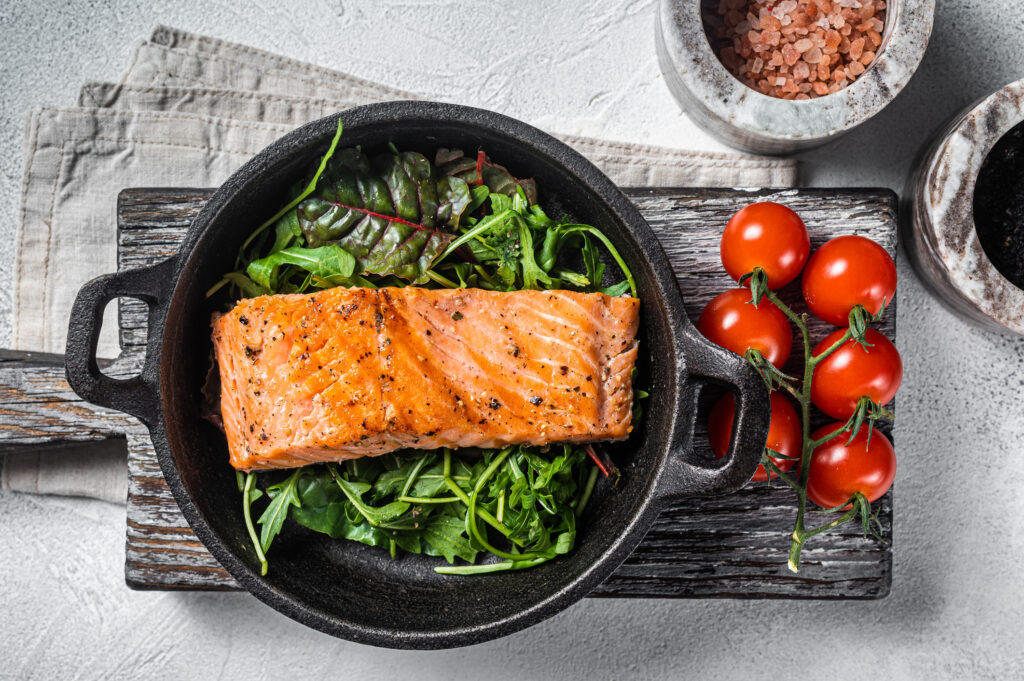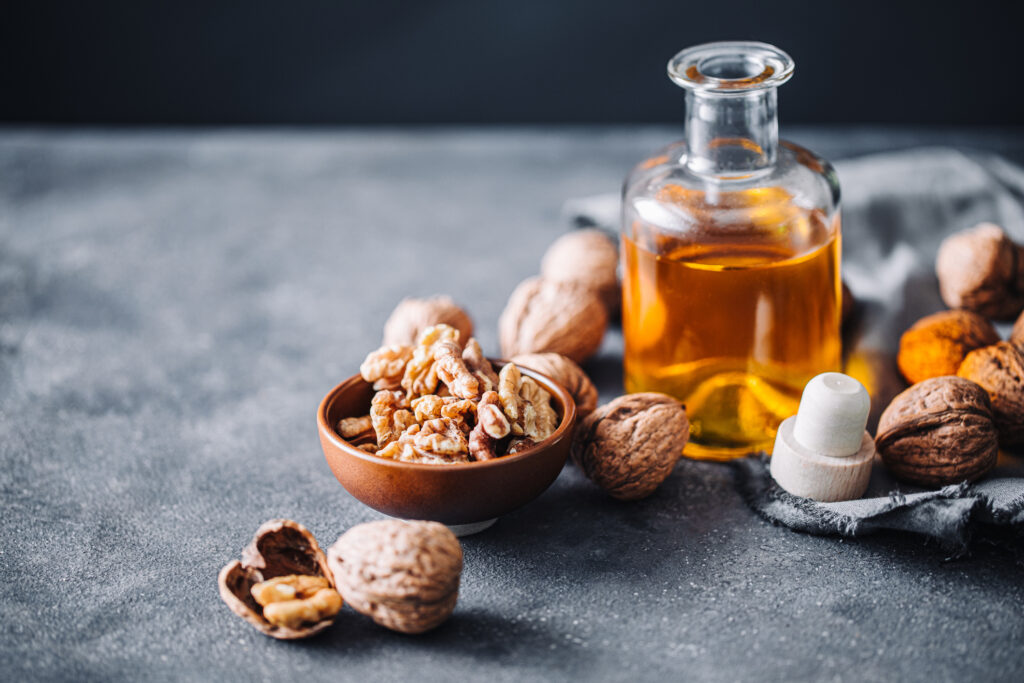Meet the Best Foods for Disease Prevention


![]() (Knowing which foods can help keep you well and prevent disease is key to a healthy life. Staying well is the focus for the fifth part in our series on the nine benefits at the core of FoodTrients® and all of our recipes. What you eat matters, which is why we’ll explore one of these incredible anti-aging benefits each month and show you how they help fight the diseases of aging.)
(Knowing which foods can help keep you well and prevent disease is key to a healthy life. Staying well is the focus for the fifth part in our series on the nine benefits at the core of FoodTrients® and all of our recipes. What you eat matters, which is why we’ll explore one of these incredible anti-aging benefits each month and show you how they help fight the diseases of aging.)
Disease preventing FoodTrients® focus on foods that can help reduce the risk of, or even help navigate chronic conditions such as cardiovascular disease, diabetes, and certain cancers. Diseases are likely more common than you think, and they affect many people in the U.S. and around the world. There’s a lot of research to suggest that the foods you eat make a difference in disease management. What you eat makes a difference, so let’s explore what FoodTrients are important for preventing disease.
 Follow a Healthy Dietary Pattern
Follow a Healthy Dietary Pattern
There is no shortage of research to support how dietary choices can prevent disease. Many people focus on just a few foods to try and prevent chronic disease but it’s best to take a big-picture approach.
When it comes down to choosing from all the different diet patterns available, it can be tricky to know what’s right for you. It is important to be mindful of what will be most sustainable and beneficial long-term; having a balanced plan is often best. Read on to learn how certain dietary patterns can reduce risk factors for common degenerative and age-related diseases like heart disease, high cholesterol, diabetes, and even some cancers.
 The Healthy Plate
The Healthy Plate
The healthy plate model is a well-researched eating pattern that promotes health and decreased risk of chronic disease in a very simple way. This diet encourages individuals to focus on quantity and quality of (mostly) vegetables, fruits, portions of high fiber whole grains and starches, lean proteins, and smaller quantities of healthy fats on their plate.
 A Plant-Based Diet
A Plant-Based Diet
A plant-based diet is similar to vegetarian and vegan meal patterns in that it limits or excludes animal-based products such as animal proteins, seafood, and sometimes eggs and/or dairy products. Research strongly suggests that following a plant-based diet reduces inflammation in the body, thereby decreasing one’s chronic disease risk. Keep in mind that some plant-based diets (like the flexitarian diet) do include some meat or seafood.
 The Mediterranean Diet
The Mediterranean Diet
The “Med” diet is an extensively researched and supported dietary pattern due to its efficacy in protecting against heart disease, coronary artery disease, and cardiovascular disease. This way of eating includes olive and olive oils, vegetables, whole grains, nuts, and legumes, with moderate amounts of meat, seafood, and dairy products. It limits red meat and sweets. By consuming foods similar to those consumed in the Mediterranean region, incidence of chronic diseases can be decreased.
 DASH Diet
DASH Diet
Dietary Approach to Stop Hypertension (DASH) diet is, as the name suggests, a dietary pattern that individuals with high blood pressure are encouraged to follow. The DASH eating plan includes fruits, vegetables, whole grains, lean protein, and low-fat dairy with an emphasis on reducing your salt intake. Following this diet can lower your blood pressure and decrease your risk of heart disease and stroke.
Disease-Preventing Foods
Luckily, no matter what diet pattern you follow, disease-preventing foods can be a focus.
Here are some disease-preventing “superfoods” and the nutrients they provide that can fit into any of the diets above that are proven to reduce chronic disease risk:
 Black tea: improves circulation, may help to lower triglycerides and bad cholesterol, and may even keep cancer cells from rapidly multiplying (in some studies).
Black tea: improves circulation, may help to lower triglycerides and bad cholesterol, and may even keep cancer cells from rapidly multiplying (in some studies).- Brown, red, or black rice: great high fiber rice varieties have cholesterol-lowering plant compounds to keep your digestive tract moving smoothly. Rice contains unique antioxidants (especially in the colored types – red and black) that support health and calm chronic inflammation.
- Legumes (e.g. beans, peas, and lentils): great sources of plant-based, high-fiber protein that can improve blood sugar levels and decrease risk of chronic diseases such as diabetes, cardiovascular disease, and some cancers.
- Leafy greens (e.g. collard greens, kale, Swiss chard): contain fiber and antioxidants to decrease inflammation and risk of chronic disease. They are also rich in unique plant compounds that are proven to support age-related eye problems.
- Olives and extra virgin olive oil: an excellent source of vitamin E and antioxidants to protect against cancer- causing free radicals. Olives also may help lower the risk of stroke and other heart related diseases when consumed regularly.
 Salmon: this fatty cold-water fish is full of omega-3 fatty acids to support cognitive function and calm inflammation in the body. Eating fish 2x per week is strongly correlated with heart health.
Salmon: this fatty cold-water fish is full of omega-3 fatty acids to support cognitive function and calm inflammation in the body. Eating fish 2x per week is strongly correlated with heart health.- Walnuts: are rich in phytonutrients (healthy plant compounds) that could help prevent chronic diseases such as cardiovascular disease and some cancers. Walnuts are very anti-inflammatory.
While there are plenty of foods that have health benefits, it is important to note that not one food can always prevent or reverse all chronic diseases. If you or a loved one is facing a complex chronic disease, consult with a medical care team to find the best plan for you.
 Anti-Inflammatory
Anti-Inflammatory
Anti-Inflammatory Foods: the Top 10
 Antioxidants
Antioxidants
Antioxidants Help Slow Down Premature Aging
 Beauty
Beauty
Beauty Is So Much More Than Skin Deep
 Detox
Detox
Which Foods Are Best To Help You Detox?
 Disease Prevention
Disease Prevention
Meet the Best Foods for Disease Prevention
 Gut health
Gut health
Good Gut Health Helps Prevent Diseases – FoodTrients
 Immunity Booster
Immunity Booster
How To Support Your Immune System Naturally
![]()
Strength
Strength-Building Food Is Key to Aging Well
References
- Menzel, J., Jabakhanji, A., Biemann, R., Mai, K., Abraham, K., & Weikert, C. (2020). Systematic review and meta-analysis of the associations of vegan and vegetarian diets with inflammatory biomarkers. Scientific reports, 10(1), 21736.
- Romagnolo, D. F., & Selmin, O. I. (2017). Mediterranean Diet and Prevention of Chronic Diseases. Nutrition today, 52(5), 208–222.
- Suri, S., Kumar, V., Kumar, S., Goyal, A., Tanwar, B., Kaur, J., & Kaur, J. (2020). DASH Dietary Pattern: A Treatment for Non-communicable Diseases. Current hypertension reviews, 16(2), 108–114.